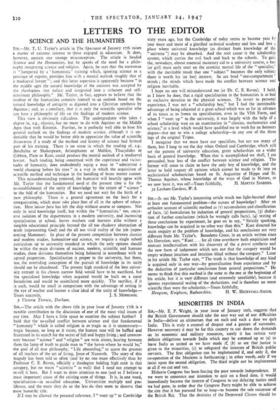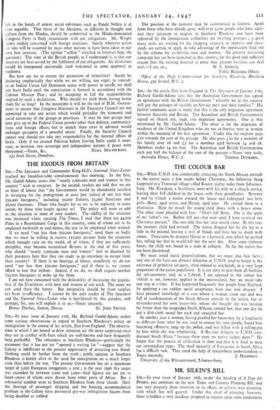MINORITIES IN INDIA
Sul,—Mr. E. P. Wright, in your issue of January roth, suggests that the British Government should take the easy way out of our difficulties in India—deliver an ultimatum that on such and such a date we quit India. This is truly a counsel of despair and a gesture of surrender. However necessary it may be for this country to cut down, the demands on its economic and military resources, surely it has certain very definite obligations towards India which may be summed up as (a) to leave India as united as we have made if, (b) to see that justice is given to the minorities, (c) to safeguard the interests of British public servants. The first obligation can be implemented if, and only if, the co-operation of the Moslems is forthcoming ; in other words, only if we insist upon the second obligation. The third might not be implemented at all if we cut and ran.
Hitherto Congress has been forcing the pace towards independence. If we were to announce our intention to quit on a fixed date, it would immediately become the interest of Congress to use delaying tactics until we had gone, in order that the Congress Party might be able to achieve the aim that it has pursued for so long—to become the sole successor of the British Raj. That the destinies of the Depressed Classes should be
left in the hands of ardent social reformers such as Pandit Nehru is at least arguable. That those of the Mcslems, so different in thought and
culture from the Hindus, should be committed to the Hindu-dominated Congress Party is flatly inconsistent with our obligations. Mr. Wright seems unduly concerned with foreign reactions. Surely whatever action we take will be assumed by most other nations to have been taken in our own best interests. (The epithet " selfish " attached to interests begs the question.) The view of the British people, as I understand it, is that our interests are best served by the fulfilment of our obligations. An ultimatum would be interpreted universally (and welcomed in some quarters) as weakness.
But how are we to ensure the proteotion of minorities? Surely by declaring emphatically that while we are willing, nay eager, to concede to an Indian Union full Dominion status with power to secede, we shall not leave India until the constitution is formed in accordance with the Cabinet Mission Plan ; and by accepting in full the responsibilities implied by such a declaration. Why should we shirk them, having borne them for so long? In the meantime it will be the task of H.M. Govern- ment to ensure that Congress Ministers in the Executive Council are not permitted to take any action which would prejudice the economic and social autoncmy of the groups or provinces. It may be that groups may later give up to the Federal Union powers other than defence, communica- tions and foreign affairs, but to snatch them away in advance would endanger prospects of a peaceful union. Finally, the Security Council cannot and should not take any responsibility for the internal affairs of India. Only if we created Pakistan before leaving India could it inter- vene, as between two sovereign and independent nations if peace were



































 Previous page
Previous page